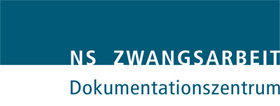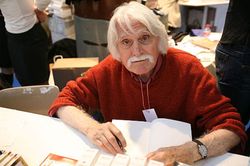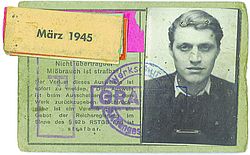François Cavanna
François Cavanna was born in 1923 as the son of an Italian construction worker and a French maid and grew up in Nogent-sur-Marne near Paris. After finishing elementary school, Cavanna worked as a fruit seller and letter sorter in Paris. Shortly before the invasion of the Wehrmacht, he had begun an apprenticeship as a bricklayer.
In 1943, the then 20-year-old came to Berlin against his will, where he was forced to work for the traditional electrical company Graetz AG. There he fell in love with the Ukrainian forced laborer Maria. After the liberation, the couple made big plans. But they were suddenly separated when Maria was deported to the Soviet Union by soldiers of the Red Army.
Cavanna, who had returned to Paris, dealt with his experiences of forced labor by producing political cartoons for the magazine Les déportés du travail published by an association of former Nazi forced laborers. He then decided to work as a draughtsman and journalist. In 1960 he co-founded the satirical magazine Hara-Kiri and in 1970 the magazine Charlie Hebdo. Cavanna also produced numerous novels with and without autobiographical references, essays and translations.
His love for Maria was the focus of "Les Russkoffs", his second autobiographical novel. The volume was published in 1981 as "Das Lied der Baba" in the Federal Republic of Germany and in 1988 in the GDR.
Under the headline "Adieu, Baumschulenweg" he wrote about the reason for his modesty: "As in 1945 almost all people did, the brutal insight into the true existence of death camps, into organized mass extermination and this made me more modest when it came to talking about my own "suffering". In view of such things, we small forced laborers have no choice but to keep our mouths shut. And so I keep it to this day".


